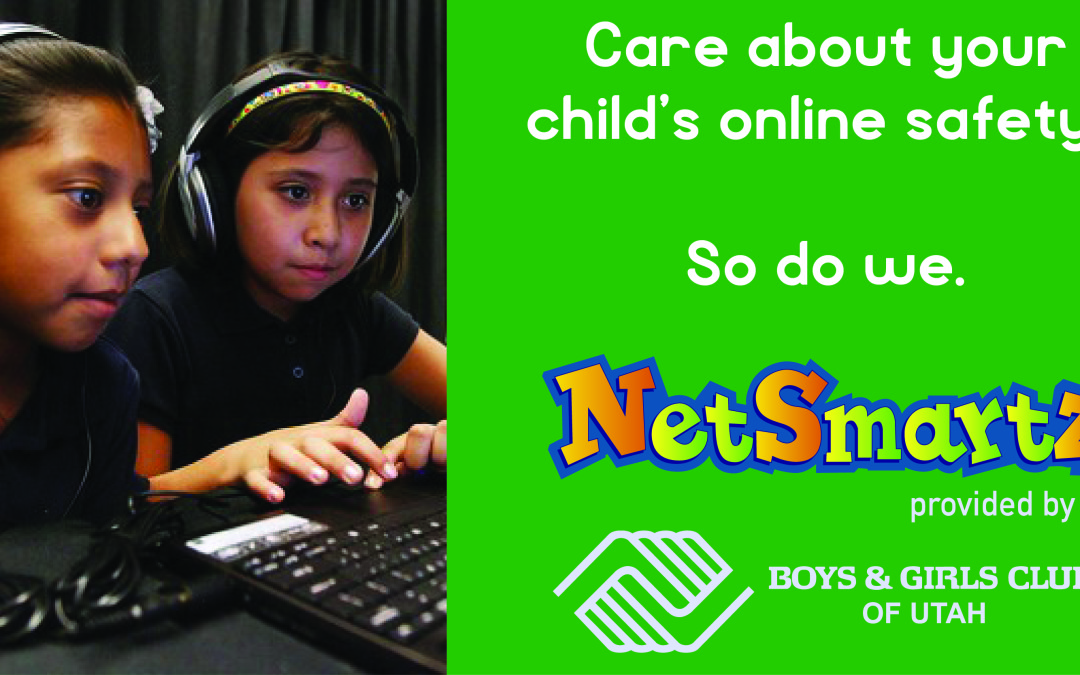June is Internet Safety Month for the Boys & Girls Clubs of America, and here at the Utah County Clubs we’re proud to host NetSmartz, a program that teaches youth how to be safe and have great digital futures.
In honor of it being Throwback Thursday I interviewed NetSmartz Director, Max Rogers, about how the program has developed over the years. Max has been with the program since September 2006, nearly 10 years.
What is NetSmartz?
NetSmartz provides trainings to students in Utah schools. The goal of the program is to provide these youth with the knowledge and confidence to protect themselves and their digital futures. These trainings are motivational and include interactive components to help students to participate in the training. Follow-up trainings are also provided that give students a hands-on individual learning experience. Trainings are broken up by age group, typically grades K-2, 3-4, 5-6, middle/junior high school, and high school. This allows for trainings to be geared in age-appropriate ways to concerns and issues facing youth in each age group.
Growth over time
Let’s look at 2006 for a moment. According to infoplease 2006 saw the birth of a new mini-blogging site called Twitter. Myspace became the most popular social networking site in the United States. Facebook launched its news feed feature to “a mixed reaction.” (Isn’t that how it goes with every Facebook update? Glad to see some things haven’t changed in the last decade.) Finally, 2006 was the year Google acquired YouTube.
People were still using flip phones, and having a data plan was the exception, not the norm. Remember Razr phones? They were all the rage in 2006. TV shows like Lost, Friday Night Lights, Dancing with the Stars, American Idol, Heroes, The Office, and 30 Rock were playing. Kids enjoyed updating their MySpace profiles and visiting funny sites like Homestar Runner.
In 2006, NetSmartz had three staff members and provided trainings to 23,100 participants. In 2014, with nine staff members, trainings were provided to 498,211 participants across 72 percent of Utah’s schools.
Accomplishments
“The greatest accomplishment of the program has been affecting real change in the lives of the program participants,” Rogers explains. Following these training sessions, students will approach NetSmartz staff members and their teachers for help with issues they have been too afraid or naïve to address.
We recently had several students at a school in Davis County come forward to report an internet predator who had been soliciting youth throughout the entire northern region of Utah. The students made their reports immediately following our training. Law enforcement was able to get involved and follow up on the solicitations. More importantly, those students are now much safer because they know to watch out for and how to report these individuals.
Recently, the NetSmartz staff has implemented post-program surveys to help measure the impact of their program on the youth they serve. According to the most recent survey results:
- 71 percent of students are better prepared to face Internet dangers after participating in the training,
- 37 percent of students are more informed about Internet dangers after participating in the training, and
- 02 percent of students are more likely to report cyberbullying after participating in the training.
Tips for parents
The final question I asked in the interview was what recommendations Max had for parents on ways to help their kids be safe online this summer. As a father of young children and an expert on Internet safety, he provided the following is his response.
The very best thing a parent can do to keep their kids safe online is to have open and regular discussions about these topics with their children. Begin early and have these discussions often. Advance the topics of discussion as your kids get older.
Help them understand that they can talk to you about these issues without getting in trouble. Let them know that you are not going to take their devices away. If your children are afraid that you will take their phone, computer, or tablet away if they tell you about a bad online experience, they will not tell you about it.
Create that open line for discussion by being honest and open with them. Tell them you don’t know a lot about these things. Ask them to tell you what is going on at their school and online. Are kids sexting at your school? Do you hear about it and how often? What apps or services do you like to use and why are they cool? What games do you play online? Can you talk to people on that game? Can you show me? Have you ever had anyone on the Internet say anything to you about sex or shown you anything that made you uncomfortable?
As parents we need to realize that it is no longer “if” but “when” our kids will experience these dangers online. We should be available to help them when that happens.

